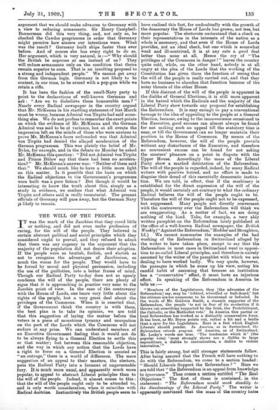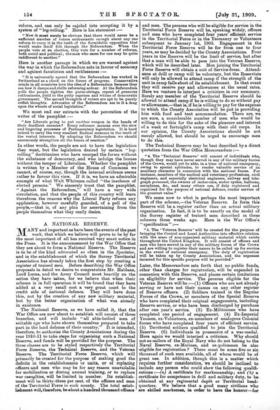THE WILL OF THE PEOPLE.
IT was the mark of the Jacobins that they cared little or nothing, and did not even make profession of caring, for the will of the people. They believed in certain abstract political and social principles which they considered ought to prevail, and they refused to admit that there was any cogency in the argument that the majority of the population did not desire their adoption. If the people were so brutish, foolish, and slavish as not to recognise the advantages of Jacobinism, so much the worse for the people. They would have to be forced by moral and physical persuasion, including the use of the guillotine, into a better frame of mind. Though our Radical Party to-day does not so openly condemn the will of the people, there are plenty of signs that it is approaching in practice very near to the Jacobin point of view. In the case of the controversy with the House of Lords, one hears very little about the rights of the people, but a very great deal about the privileges of the Commons. When it is asserted that, if the Government think the country is with them, the best plan is to take its opinion, we are told that this suggestion of laying the matter before the voters is a piece of monstrous tyranny and usurpation on the part of the Lords which the Commons will not endure at any price. We can understand members of an Executive Government feeling that it would not do to be always flying to a General Election to settle this or that matter; but between this reasonable objection, and• the way in which any notion that the Lords have a right to force on a General Election is scouted as " an outrage," there is a world of difference. The mere suggestion of an appeal to their masters, the electors, puts the Radical Party into a ferment of ungovernable fury. It is much more usual, and apparently much more popular, to appeal to abstract Liberal principles than to the will of the people. Indeed, it almost comes -to this : that the will of the people ought only to be attended to, and is only worth consideration, when it coincides with Radical doctrine. Instinctively the British people seem to have realised this fact, for undoubtedly with the growth of the democracy the House of Lords has grown, not less, but more popular. The electorate understand that a check on their representatives in the interests of the nation as a whole is necessary, and that even if the House of Lords provides, not an ideal check, but one which is somewhat weak and ill-contrived, it is at any rate a good deal better than none at all. Hence the cry of " The privileges of the Commons in danger ! " leaves the country quite cold, while, on the other hand, nobody is at all; • angry at the plea of the Lords that the working of the. Constitution has given them the function of seeing that the will of the people is really carried out, and that they have no business to abandon that function because of the noisy threats of the other House.
If this distrust of the will of the people is apparent in the dislike of General Elections, it is still more apparent in the hatred which the Radicals and the majority of the Liberal Party show towards any proposal for establishing the Referendum. It is easy enough to pay a conventional homage to the idea of appealing to the people at a General Election, because, owing to the inconvenience occasioned to the Executive, good excuses can almost always be found for not making such an appeal till the statutory time is near, or till the Government can no longer maintain their position in the House of Commons. By means of the Referendum, however, the will of the people prevails without any disturbance of the Executive, and therefore no convenient excuse can be found for not asking the masters' pleasure on a point in dispute with the Upper House. Accordingly the mass of the Liberal Party show a marked detestation of the Referendum. The will of the people is regarded, indeed, by many Radical writers with positive hatred, and no effort is made to • disguise their dread of this essentially democratic institu- tion. We are told, in effect, that if the machinery is established for the direct expression of the will of the people, it would certainly act contrary to what the ordinary Radical believes the will of the people ought to be. Therefore the will of the people ought not to be expressed, but suppressed. Many people not directly conversant with the controversy over the Referendum will think we are exaggerating. As a. matter of fact, we are doing nothing of the kind. Take, for example, a very ably written pamphlet on the Referendum lately published at the office of a well-known Radical newspaper, the British. Weekly ("Against the Referendum," Hodder and Stoughton, ld.) We cannot summarise the examples of the bad working of the Referendum in Switzerland alleged by the writer to have taken place, except to say that the Referendum in most cases in Switzerland went in opposi-; tion to so-called Liberal principles, and therefore is naively assumed by the writer of the pamphlet with which we are dealing to have worked badly. We may quote, however, the passages in which he sums up his view, noting his candid habit of assuming that because an institution has a "conservative" effect, it must have an injurious effect. In speaking of the Referendum in America he tells us :— " Members of the Legislatures, they [the advocates of the Referendum] say, may be lobbied, wheedled or bull-dozed,' but the citizens are too numerous to be threatened or befooled. In the words of Mr. Goldwin Smith, a staunch supporter of the Referendum, the people is not in fear of its re-election if it throws out something supported by the Irish, the Prohibitionist, the Catholic, or the Methodist vote! In America this partial or local Referendum has worked as a distinctly conservative force. It has been, as Mr. Bryce points out, rather a bit and a bridle than a spur for the Legislature. Here is a fact which English Liberals should ponder. In America, as in Switzerland, the Referendum retards progress. Of America, as of Switzerland, Mr. Lecky's words are true. The tendencies which it' (the popular vote) most strongly shows are a dislike to large expenditure, a dislike to centralisation, a dislike to violent innovation."
This is fairly strong, but still stronger statements follow. After being assured that the French will have nothing to do with the Referendum, we come to a section headed : " Should Liberals Support the Referendum ? " Here we are told that " the Referendum is an appeal from knowledge.
to ignorance." Then comes a section entitled " The Beal Objections." The first • of these is contained, in the statement: " The Referendum would work steadily: to the disadvantage of the Liberal Party." The writer is apparently convinced that the mass of the country hates reform, and can only be cajoled into accepting it by a system of "log-rolling." Here is his statement :- " Now it must surely be obvious that there would never be a sufficient number of voters enthusiastic enough about any one reform to carry it in the teeth of the formidable opposition that would make itself felt through the Referendum. When the people vote at an election, they vote for a number of reforms, both social and political ; the man who cares for one may be quite indifferent to another."
Here is another passage in which we are warned against the way in which the Referendum acts in favour of economy and against fanaticism and recklessness :- " It is universally agreed that the Referendum has worked in Switzerland as a check on the forces of progress. Conservative minds in all countries love the idea of a Referendum because they see how it damps and chills reforming ardour. At the Referendum polls the people tighten the purse-strings, repent of generous enthusiasms, yield to the petty caprices and whims of democratic government. The second thoughts of voters are apt to be purely selfish thoughts. Advocates of the Referendum see in it a drag upon the wheels of social legislation."
We must end our extracts with the peroration of the writer of the pamphlet :- " Are Liberals going to put another weapon in the hands of their deadliest enemies ? Every reformer mourns over the slow and lingering processes of Parliamentary legislation. It is hard indeed to carry the very smallest Radical measure in the teeth of the vested interests. By adopting the Referendum we should enormously strengthen all the forces of reaction."
In other words, the people are not to have the legislation they want, but the legislation desired by certain " log- rolling" doctrinaires who have usurped the forms without the substance of democracy, and who indulge the license without the temper of Liberalism. Whether the pamphlet is written by a Member of the House of Commons we cannot, of course, say, though the internal evidence seems rather to favour this view. If it is, we have an admirable example of what Walt Whitman called " the insolence of elected persons." We sincerely trust that the pamphlet, " Against the Referendum," will have a very wide circulation, and that the people of this country will learn therefrom the reasons why the Liberal Party refuses any application, however carefully guarded, of a poll of the people,—that is, of any plan for ascertaining from the people themselves what they really desire.







































 Previous page
Previous page